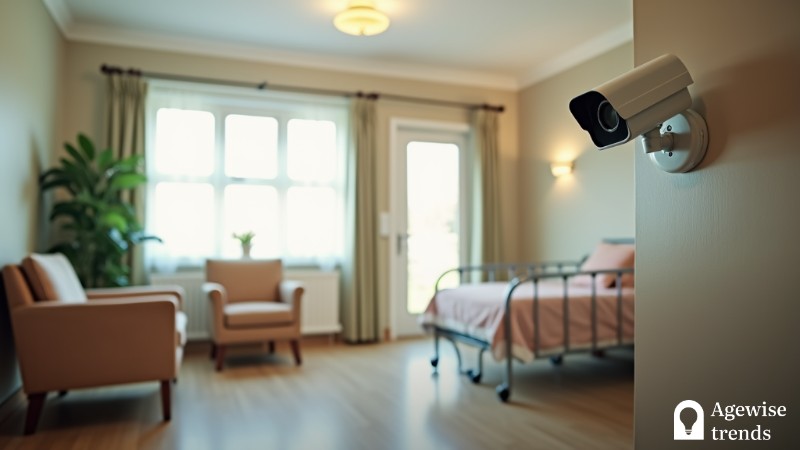A new law in Rhode Island is giving families a powerful tool to ensure the safety of their elderly loved ones in nursing homes and assisted living facilities.
The Rhode Island Electronic Monitoring in Nursing and Assisted Facilities Act allows family members and residents to place security cameras in a patient’s living space.
Key Takeaways
Rhode Island has passed a law allowing families to install security cameras in nursing home rooms to ensure better oversight and prevent abuse.
- Families and residents can now place security cameras in living spaces for enhanced monitoring and peace of mind.
- Cameras are expected to help verify claims of potential abuse or neglect, which currently average one report per day at some facilities.
- The law aims to balance transparency with privacy concerns, providing detailed guidelines and consent forms for implementation.
The impact on families and residents
As the head of Advocates for Better Care RI, Kathleen Gerard expressed relief over this development.
“This measure will bring a lot of peace of mind to families who are already dealing with the stress of caring for an elderly relative,” she stated.
James Delisle, whose family member was allegedly assaulted in a nursing home three years ago and never received justice, has been advocating strongly for this legislation. He believes that cameras will be critical in preventing abuse and ensuring accountability within care facilities.
On average, there is one reported issue concerning potential abuse or neglect daily, as noted by Rhode Island’s Long-Term Care Ombudsman for a particular care center. However, many of these claims are difficult to verify due to insufficient evidence or witnesses.
I know that there are a lot of residents and family care partners who are going to breathe a sigh of relief when they are finally able to install a camera
Kathleen Gerard
The new law aims to bridge this gap by offering families another means of monitoring and safeguarding their loved ones.
Balancing transparency and privacy
Rhode Island Assisted Living Association (RIALA) backs increased transparency while stressing privacy concerns and the need for a homelike setting in assisted living.
The Rhode Island Department of Health plans to distribute detailed guidelines and consent forms for facilities shortly.
Until then, Advocates for Better Care RI will share initial resources from the Long-Term Care Ombudsman program with families to assist them in beginning their process.
In-home care services are also looking at how this new law might affect their operations and patient privacy.
For those considering in-home nursing care or other forms of senior support, installing cameras could become a standard practice for ensuring safety and accountability.
Senior citizens living independently with home care services may find that similar monitoring measures are recommended as part of a broader strategy to ensure their well-being.
Individuals worried about possible abuse or neglect within a long-term care setting are encouraged to call the Rhode Island State Long-Term Care Ombudsman at (401) 785-3340 for help.
Enhancing care in nursing homes
Advocates hope this new law will serve as a model for other states looking to improve oversight and protect the rights of their elderly residents.
While we understand the law’s intent to enhance transparency and provide peace of mind to families, we have concerns about how it may impact the home-like environment that defines assisted living
Hanan Babikir Bedri, RIALA executive director
For families struggling with the uncertainty surrounding senior care, these cameras represent an important step forward in ensuring the safety and dignity of those who depend on assisted living or nursing home services.
The push for better monitoring highlights a growing concern about the quality of life and protection afforded to older individuals in care facilities.
As more states consider similar legislation, it becomes increasingly clear that transparency is key to building trust between families and senior care providers.
Adapting to new requirements
Families who choose to install cameras must balance their desire for security with respecting residents’ privacy, a challenge inherent in any form of assisted living or home care service.
Assisted living facilities are particularly sensitive about maintaining a homelike atmosphere, making implementing this law an interesting case study.
Home care services and nursing homes must adapt their policies to accommodate the new requirements while still upholding high standards of resident comfort and dignity.
This development underscores the ongoing conversation about senior support and how technology can enhance safety without compromising quality of life.
Surveillance cameras can enhance care in nursing homes if appropriately used.














